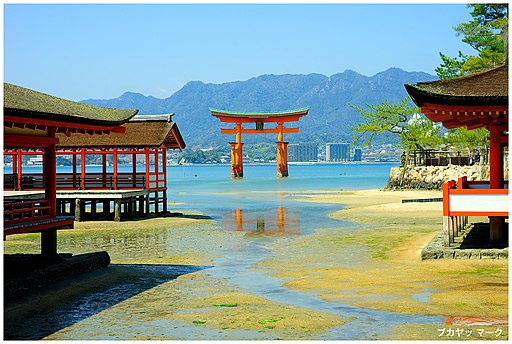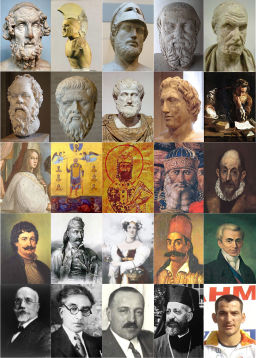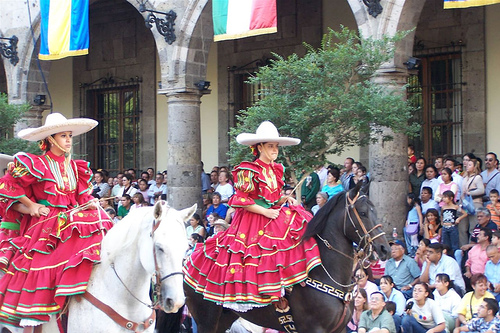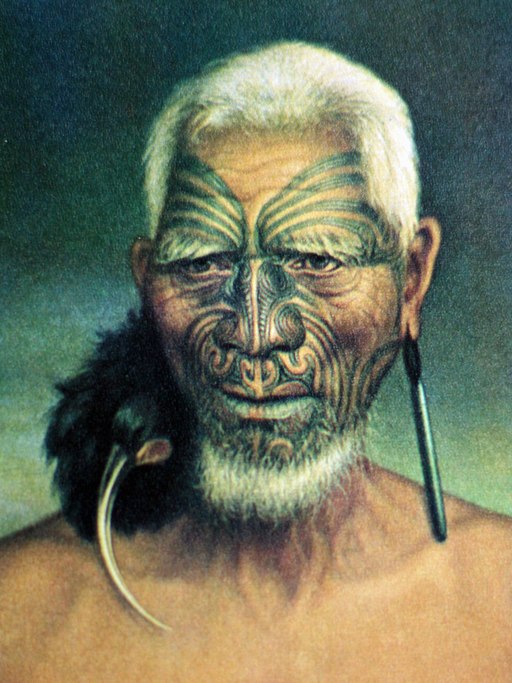
“Saint George and the Dragon” by Tintoretto depicts the legend of the saint slaying a dragon that demanded human sacrifices and thereby rescuing the princess chosen as the next offering.
The earliest Byzantine icons representing Saint George as a horseman killing the dragon are dated to the 12th century.
Pictures of Saint George and the Dragon became popular in the Byzantine art of Eastern Europe and was introduced into the Western Christian art tradition by the Crusades.
The small size of this canvas suggests it was painted for personal use and not for display in a large church.
In this painting, Saint George is shown about to defeat the dragon, by the edge of the sea. The fleeing princess is dominant in the foreground.
In the center lies the previous victim, which the dragon was about to eat. The figure of God blessing Saint George appears in the sky.
The blue and rose colors are echoed in the draperies and the tints of the cloudscape. The horizon and viewpoint help create tension and drama in the picture.
Tintoretto
Tintoretto was an Italian painter whose speed in painting, and the boldness of his brushwork he was referred to as Il Furioso by contemporaries.
His work is characterized by the dramatic and bold use of perspective.
Saint George and the Dragon
- Title: Saint George and the Dragon
- Artist: Tintoretto
- Date: 1558
- Materials: oil on canvas
- Museum: The National Gallery, London
Tintoretto
- Artist: Tintoretto
- Birth Name: Jacopo Comin
- Born: 1518 – Venice, Republic of Venice, Italy
- Died: 1594 (aged 75) – Venice, Venetian Republic, Italy
- Nationality: Italian
- Movement: Renaissance, Mannerism
- Notable Works:
- The Origin of the Milky Way
- Saint George and the Dragon
- Self-Portrait as a Young Man
Tintoretto: ‘Saint George and the Dragon’
Exploring Heros on Horseback
- Black St George Icon
- “Perseus and Andromeda” by Joachim Wtewael
- “Perseus and Andromeda” by Giuseppe Cesari
- “Perseus and Andromeda” by Frederic Leighton
- “Perseus and Andromeda” by Titian
Explore The National Gallery
13th Century Paintings
- “The Virgin and Child Enthroned, with Narrative Scenes” by Margarito d’Arezzo – 1264
- “The Virgin and Child” by Master of the Clarisse – 1268
- “Crucifix” by Master of Saint Francis – 1270
14th Century Paintings
- Wilton Diptych – 1395
- “The Annunciation” by Duccio – 1311
- “The Healing of the Man Born Blind” by Duccio – 1311
15th Century Paintings
- “Arnolfini Portrait” by Jan van Eyck – 1434
- “The Battle of San Romano” by Paolo Uccello– 1440
- “Venus and Mars” by Sandro Botticelli – 1483
- “Portrait of Doge Leonardo Loredan” by Giovanni Bellini– 1501
16th Century Paintings
- “Mystic Nativity” by Sandro Botticelli – 1550
- “Virgin of the Rocks” by Leonardo da Vinci – 1506
- “The Madonna of the Pinks” by Raphael – 1507
- “The Raising of Lazarus” by Sebastiano del Piombo– 1519
- “Salvator Mundi” by Andrea Previtali – 1519
- “Bacchus and Ariadne” by Titian – 1523
- “The Ambassadors” by Hans Holbein the Younger – 1533
- “Mary Magdalene” by Girolamo Savoldo – 1540
- “Saint George and the Dragon” by Tintoretto – 1558
- “The Family of Darius before Alexander” by Paolo Veronese – 1567
- “Diana and Actaeon” by Titian – 1569
- “The Rape of Europa” by Paolo Veronese – 1570
- “The Death of Actaeon” by Titian – 1575
- “The Origin of the Milky Way” by Tintoretto – 1575
17th Century Paintings
- “Supper at Emmaus” by Caravaggio – 1601
- “Samson and Delilah” by Peter Paul Rubens – 1610
- “The Judgement of Paris” by Peter Paul Rubens – 1635
- “Aurora abducting Cephalus” by Peter Paul Rubens – 1637
- “Equestrian Portrait of Charles I” by Anthony van Dyck – 1638
- “Venus at her Mirror” by Diego Velázquez – 1651
- “Self Portrait at the Age of 63” by Rembrandt – 1669
- “A Young Woman standing at a Virginal” by Johannes Vermeer – 1670
18th Century Paintings
- “Bacchus and Ariadne” by Sebastiano Ricci – 1713
- “A Regatta on the Grand Canal” by Canaletto – 1740
- “Mr. and Mrs. Andrews” by Thomas Gainsborough – 1749
- “Eton College” by Canaletto – 1754
- “An Experiment on a Bird in the Air Pump” by Joseph Wright of Derby – 1768
- “Self-portrait in a Straw Hat” by Louise Élisabeth Vigée Le Brun – 1782
Tintoretto: Artist of Renaissance Venice
Venice: Bellini, Titian and Giorgione
St.George and the Dragon
~~~
“The saint who works no miracles isn’t glorified.”
– Greek Proverb
~~~
Photo Credit: 1)Tintoretto [Public domain], via Wikimedia Commons
Popular this Week








 Sponsor your Favorite Page
Sponsor your Favorite Page SEARCH Search for: Search Follow UsJoin – The JOM Membership Program
Sponsor a Masterpiece with YOUR NAME CHOICE for $5
Share this:
- Tweet
